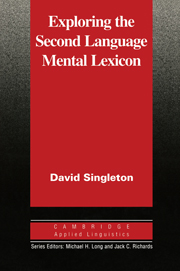Book contents
- Frontmatter
- Contents
- Series editors' preface
- Foreword
- Acknowledgements
- I INTRODUCTION AND PROLEGOMENA
- II RESEARCH REVIEW
- III EVIDENCE FROM THE TRINITY COLLEGE DUBLIN MODERN LANGUAGES RESEARCH PROJECT
- 5 The Trinity College Dublin Modern Languages Research Project in broad outline
- 6 Findings on form and meaning in the L2 mental lexicon
- 7 Findings on the cross-linguistic factor in lexical processing and acquisition
- 8 Findings on communication strategies
- IV CONCLUSION
7 - Findings on the cross-linguistic factor in lexical processing and acquisition
Published online by Cambridge University Press: 05 October 2012
- Frontmatter
- Contents
- Series editors' preface
- Foreword
- Acknowledgements
- I INTRODUCTION AND PROLEGOMENA
- II RESEARCH REVIEW
- III EVIDENCE FROM THE TRINITY COLLEGE DUBLIN MODERN LANGUAGES RESEARCH PROJECT
- 5 The Trinity College Dublin Modern Languages Research Project in broad outline
- 6 Findings on form and meaning in the L2 mental lexicon
- 7 Findings on the cross-linguistic factor in lexical processing and acquisition
- 8 Findings on communication strategies
- IV CONCLUSION
Summary
A great deal of evidence of cross-linguistic influence at work in lexical acquisition and processing has already been reviewed, notably in Chapter 4. The phenomenon of interlexical interaction, like the question of whether the L2 lexicon has a more formal basis than the L1 lexicon, has been a major topic of interest within the MLRP since its inception – and for similar reasons. That is to say, the former issue like the latter bears on the nature of the relationship between the L1 and the L2 mental lexicon. If the L2 mental lexicon were qualitatively different from the L1 mental lexicon, one would expect interaction between them to be minimal or non-existent. Reversing the terms of this argument, the fact that there are, as we have seen, so many indications that interlexical interaction is commonplace has to be taken as pritna facie evidence of the similarity of the L1 and L2 lexica.
From our own previous work in other contexts (e.g., Ridley, 1991b; Singleton, 1981, 1983, 1987a, 1987b; Singleton & Little, 1984b), it was clear to us that lexical transfer – to use the traditional term – was a reality. However, we did not initially make the connection between this and the question of whether or not there was a basic qualitative difference between the L1 and the L2 mental lexicon. It was our examination of the hypothesis that the L2 mental lexicon was essentially form-driven which brought this connection into focus. From that point onwards, the cross-lexical data which emerged from the MLRP - some of which are presented in the present chapter - took on a new relevance.
- Type
- Chapter
- Information
- Exploring the Second Language Mental Lexicon , pp. 238 - 250Publisher: Cambridge University PressPrint publication year: 1999

